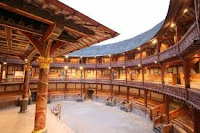 |
| Inside the globe theatre. It was interesting to view the estimated layout and style of the globe |
I went to London with college for 3 days; We visited some sites which I have found helpful for this unit. These included The Globe theatre, the new London theatre, the Royal Opera house and St Paul's (the actors church). It was interesting to discover how theatre has evolved from Shakespeare's time. Theatre was hated by the church, women were not allowed to act and the style of plays were different yet still effect theatre today. During the Restoration women were finally allowed to act, some church's were accepting theatre as a good thing and plays were becoming increasingly popular. Nowadays theatre and drama is a huge part of life, and comes in many different forms e;g theatre, ballet, comedy, pantomime, TV. It is completely accepted in society and is enjoyed by millions if not billions of people.
We also went to see the show War horse in the national theatre, this was a great example of how focused you need to be when performing, as it was clear that every performer was completely focused and giving the show everything they had.




